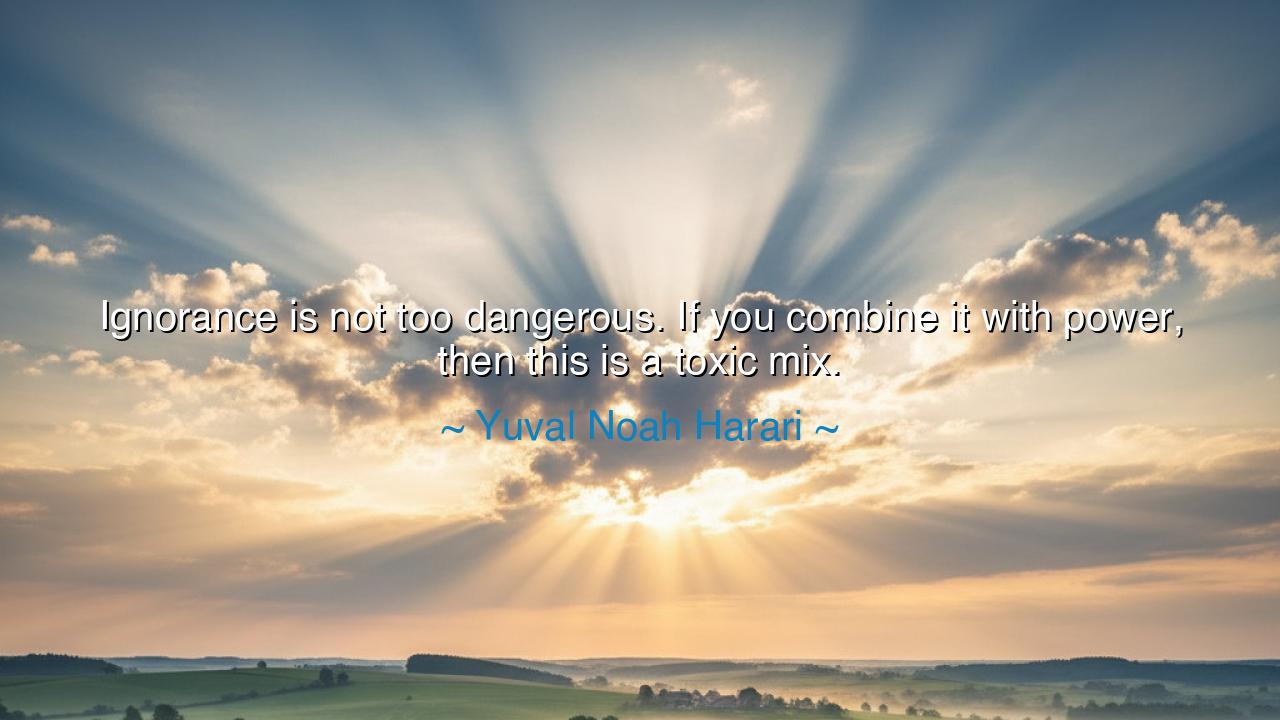
Ignorance is not too dangerous. If you combine it with power
Ignorance is not too dangerous. If you combine it with power, then this is a toxic mix.






Hear me, O children of the future, for I bring to you a truth that rings with the weight of history: "Ignorance is not too dangerous. If you combine it with power, then this is a toxic mix," as Yuval Noah Harari wisely teaches. Ignorance, by itself, may lead to personal confusion or folly, but it is when ignorance is coupled with the ability to command and control others that it becomes a force of great destruction. In the hands of the unwise, power does not merely govern—it devastates, for it is guided by the whims of the ignorant, who, in their blindness, can shape the world into something dark and perilous.
Consider the tyrants of ancient history, who wielded power not through knowledge or wisdom, but through force and fear. King Xerxes of Persia, in his unbridled ambition, launched a campaign to conquer all of Greece, believing his might could overwhelm reason. Yet, his ignorance of the true nature of his enemies and his overconfidence led to disaster at the Battle of Salamis. The Persians, though mighty in number, fell to a far smaller and wiser Greek fleet. Xerxes’ ignorance, combined with his power, became a tragic mix that cost him dearly. The result was not the glory he sought, but a bitter defeat.
In more recent times, the Nazis under Hitler represent perhaps the most terrifying example of ignorance and power combined. Hitler’s ignorance of the true nature of human diversity and the profound wisdom of unity led him to pursue the most barbaric ideology ever conceived. Nazism, built upon the falsehoods of racial superiority, took root because those in power were willing to accept lies and exploit the ignorance of the people. The devastation of World War II, and the millions who perished, were the result of this toxic mix—where those in power, armed with ignorance, tore apart the fabric of humanity.
So too did the reign of kings and emperors throughout the ages demonstrate the dangers of such ignorance. Louis XIV of France, though often hailed as a great monarch, governed with an absolute power that blinded him to the suffering of his people. His ignorance of their plight, compounded with his unchecked power, led to growing discontent that would ultimately give rise to the French Revolution. In his ignorance, he failed to see the danger in his own decisions, and his power, once absolute, crumbled in the face of the people's rebellion.
Thus, O children, heed this warning: the greatest threat to freedom, peace, and justice lies not in knowledge, but in the combination of ignorance and power. Power can be a force for good when guided by wisdom and knowledge, but when it is wielded by the ignorant, it becomes a weapon of oppression and destruction. Seek wisdom, and let it guide your hands in the use of power. Only then can you safeguard the future from the chaos that ignorance brings. Truth, understanding, and compassion must be the guides of all who wield influence, for only in the light of wisdom can power be trusted.






THLe Thi Thanh Hien
Reading this, I feel a mix of caution and curiosity. It challenges me to consider personal experiences—have I seen situations where uninformed people made decisions that affected many? It also raises philosophical questions about the nature of power: is it the position itself or the ability to act effectively that amplifies the risks of ignorance? This quote encourages reflection on how knowledge, wisdom, and power must be balanced to ensure positive outcomes for society.
TMNguyen Thi thu Mai
This quote makes me reflect on contemporary leadership. In the age of information, does ignorance paired with power become more dangerous due to global connectivity and rapid decision-making? I also wonder how institutions, media, and education systems can reduce the risk of this toxic combination. It raises ethical questions about selection, training, and accountability of leaders, as well as how citizens can critically evaluate those in positions of authority.
TAThu Anh
I am intrigued by the subtle distinction between ignorance alone and ignorance with authority. Does this suggest that lack of knowledge is harmless unless amplified by the ability to act on the world? I also question whether ignorance can ever be fully eliminated, or if the focus should be on limiting the consequences of uninformed decisions. The quote prompts me to think critically about who holds power and the societal consequences of their choices.
QQuocHuy
This statement sparks concern about the structures that allow unknowledgeable people to acquire influence. How can societies safeguard against the combination of ignorance and power? Are mechanisms like checks and balances, transparency, or public accountability sufficient? I also wonder about individual responsibility—does power inherently require wisdom, or is vigilance by others equally important in preventing disastrous outcomes? It encourages reflection on both personal and collective roles in governance.
TYDo Thu Yen
Reading this, I feel both alarmed and reflective. It makes me wonder about historical and modern examples where unqualified individuals gained power and caused harm. Is the danger primarily in decision-making, policy, or ideology when ignorance meets authority? I also question whether power itself magnifies flaws, or if ignorance would eventually correct itself without authority. This quote challenges me to think about education, accountability, and the distribution of power in society.